新目标八年级上册英语Unit2 How often do you exercise复习课件
英语人教新目标八年级上册Unit 2 How often do you exercise? Section A-频度副词

√ √ √ × × ×
√ √ × × √ ×
√ √ √ × × ×
√ √ × × × ×
√ × √ × ×
经常 × usually 常常 often
有时 sometimes
很少 seldom
从不 never
替换练习:Mary always takes a bus to school.
频度副词
这类词用来表示某一动作发生的频率,或某一状 态出现的频率,即在一定的时间内动作重复发生 或状态重复出现的次数。
Section A
grammar
Unit 2 How often do you exercise?
频度副词
★always
• always 意为“总是”,与进行时态连用 时,可以表示赞扬,也可以表示讨厌 等感情色彩。e.g. • (1)I shall always remember my fir st day at school. 我将永远记住我上 学的第一天。 • (2)He is always smoking. 他总是 抽烟。
类似every day,every weekevery Saturday或on saturdays 等等这样的频度副词短语通常放在句末,也可以放在句首。
Translate the phrases below:
一天一次 once a day 一月一次 once a month 一天五次 once two days 一天两次 twice a day 一年一次 once a year 一周两次 twice a week 一 周三次 three times a week 一年四次 four times a year 一年六次 six times a year
I
新目标英语八年级上册Unit2-How-often-do-you-exercise全单元课件

2. _w__a_t_c_h__T__V________ 3. __e_x_e_r_c__is_e_________ 4. __r_e_a__d____________ 5. __g_o__s_h__o_p__p_i_n_g____
What do you usually do on weekends?
I usually …exercise on weekends.
What ddooesysohue usually do on weekends?
SheI usually d…doeos mhery homework on weekends.
every day do homework
A: How often do you do your homework? B:_I__d_o_m__y_h_o_m_e_w_o_r_k__ev_e_r_y_d_a_y_. _________
exercises once a week
A:_H_o_w__o_ft_en__do_e_s_s_h_e _ex_e_r_ci_se_?_______ B: She exercises once a week.
• 坐火车到上海要多长时间?
• _H_o_w___lo_n_g_ is the ruler?
• 这把尺子有多长?
• _H_o_w___fa_r__ is it from your home to school?
• 你家离学校有多远?
你多久看一次电视? 一周两次。
P10 2c
• A: How often do you watch TV? • 你多久看一次电视? • B: I watch TV every day. • 我每天看电视。 • A: What’s your favorite program? • 你最喜欢的节目是什么? • B:Animal World. • 《动物世界》。 • A: How often do you watch it? • 你多久看一次? • B: Twice a week. • 一周两次。
人教版新目标版八年级英语上册-Unit-2-How-often-do-you-exercise教案
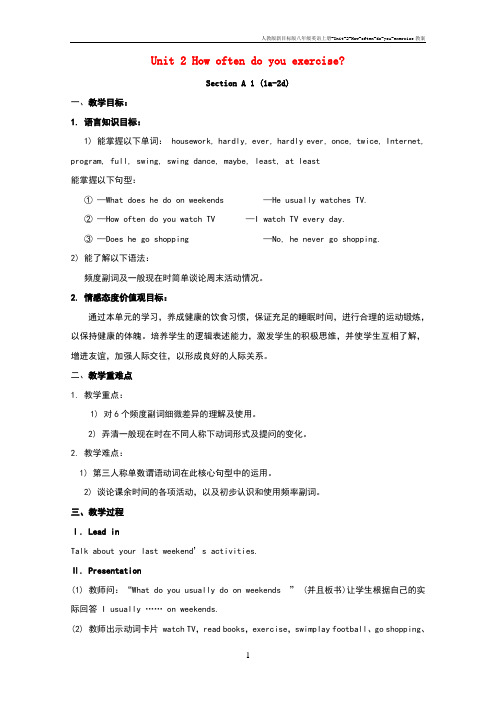
Unit 2 How often do you exercise?Section A 1 (1a-2d)一、教学目标:1. 语言知识目标:1) 能掌握以下单词: housework, hardly, ever, hardly ever, once, twice, Internet, program, full, swing, swing dance, maybe, least, at least能掌握以下句型:① —What does he do on weekends —He usually watches TV.② —How often do you watch TV —I watch TV every day.③ —Does he go shopping —No, he never go shopping.2) 能了解以下语法:频度副词及一般现在时简单谈论周末活动情况。
2. 情感态度价值观目标:通过本单元的学习,养成健康的饮食习惯,保证充足的睡眠时间,进行合理的运动锻炼,以保持健康的体魄。
培养学生的逻辑表述能力,激发学生的积极思维,并使学生互相了解,增进友谊,加强人际交往,以形成良好的人际关系。
二、教学重难点1. 教学重点:1) 对6个频度副词细微差异的理解及使用。
2) 弄清一般现在时在不同人称下动词形式及提问的变化。
2. 教学难点:1) 第三人称单数谓语动词在此核心句型中的运用。
2) 谈论课余时间的各项活动,以及初步认识和使用频率副词。
三、教学过程Ⅰ. Lead inTalk about your last weekend’s activities.Ⅱ. Presentation(1) 教师问:“What do you usually do on weekends ” (并且板书)让学生根据自己的实际回答I usually …… on weekends.(2) 教师出示动词卡片 watch TV,read books,exercise,swimplay football、go shopping、go to movies让学生回答。
新版新目标八年级上Unit 2 how often do you exercise
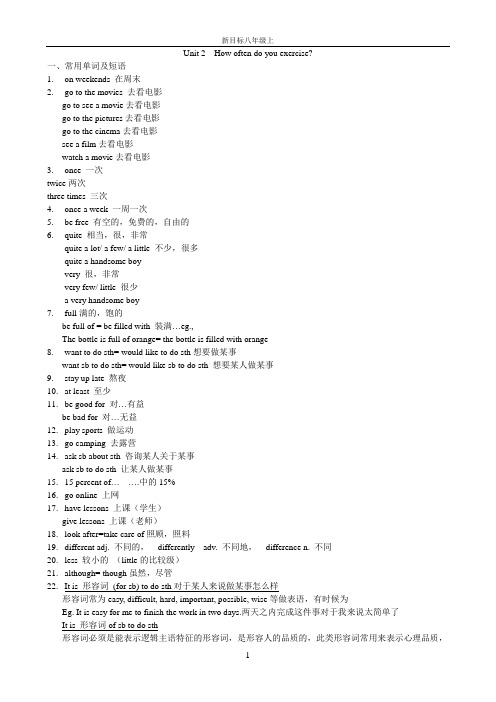
Unit 2 How often do you exercise?一、常用单词及短语1.on weekends 在周末2.go to the movies 去看电影go to see a movie去看电影go to the pictures去看电影go to the cinema去看电影see a film去看电影watch a movie去看电影3.once 一次twice两次three times 三次4.once a week 一周一次5.be free 有空的,免费的,自由的6.quite 相当,很,非常quite a lot/ a few/ a little 不少,很多quite a handsome boyvery 很,非常very few/ little 很少a very handsome boy7.full满的,饱的be full of = be filled with 装满…eg.,The bottle is full of orange= the bottle is filled with orange8.want to do sth= would like to do sth想要做某事want sb to do sth= would like sb to do sth 想要某人做某事9.stay up late 熬夜10.at least 至少11.be good for 对…有益be bad for 对…无益12.play sports 做运动13.go camping 去露营14.ask sb about sth 咨询某人关于某事ask sb to do sth 让某人做某事15.15 percent of…….中的15%16.go online 上网17.have lessons 上课(学生)give lessons 上课(老师)18.look after=take care of照顾,照料19.different adj. 不同的,differently adv. 不同地,difference n. 不同20.less 较小的(little的比较级)21.22.形容词常为easy, difficult, hard, important, possible, wise等做表语,有时候为Eg. It is easy for me to finish the work in two days.两天之内完成这件事对于我来说太简单了It is 形容词of sb to do sth形容词必须是能表示逻辑主语特征的形容词,是形容人的品质的,此类形容词常用来表示心理品质,性格特征等,例如kind, nice, stupid, clever, foolish, polite, impolite, silly, selfishEg. It’s nice of you to help me with my homework. 你真是太好了23.die v. 死,dead adj. 死的,death n.死die of死因存在于人体之上或之内(主要指疾病、衰老等自身的原因),die from若死因不是存在人体之内或之上,而是由环境造成的(主要指事故等方面的外部原因) 24.such as 常列举同类人或物中的几个例子,可与and so on 连用for example 一般列举同类人或物中的“一个”为例,做插入语,可位于句首,居中,句末二、常用句型1.Here are the results.结果如下2.--What do you usually do on weekends?--I always exercise.3.--How often do you go to the movies?--I go to the movies maybe once a month三、重点语法(二)对频度副词提问时,用how often。
英语人教新目标八年级上册unit 2 How often do you exercise

2a Listen and Number the activities you hear.
Activities
a. 3 go to the movies b. 1 watch TV c. 5 shop d. 4 exercise e. 2 read
How often
every day once a week twice a week three times a week once a month twice a month
go to the movies
exercise
dance
read
watch TV
go shopping play the piano
1a Make a list of the weekend activities.
bc
d
e a
What do you usually do on weekends? I often go to the movies.
I usually … often … sometimes …
always …
What does he / she usually do on weekends?
He / She usually … always … sometimes … often …
What does he / she usually do on weekends?
He / She usually … always … sometimes … often …
Read the conversation in 1b and repeat the conversation with your own words. Then write it down in your exercise book.
人教新目标八年级上册Unit 2 How often do you exercise Section
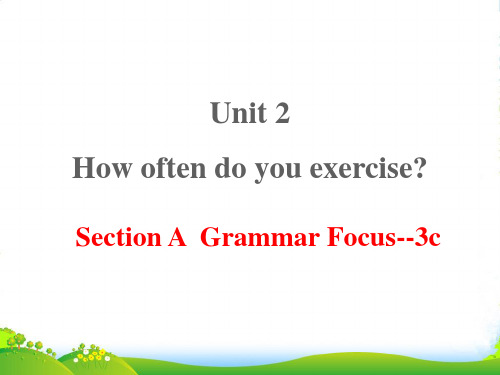
Every day
A: How often do you do your homework? B: I do my homework every day.
you:
play basketball
A: How often do you .....? B: I ..... once a week.
Unit 2 How often do you exercise?
Section A Grammar Focus--3c
always
总是
often
常常
hardly ever
几乎从不
help with housework
usually
通常
sometimes
有时
never
从不
What do you usually do on weekends? I always/often/usually/sometimes...
go to the English club twice a week
hardly ever talk with foreigners(外国人)
Report(报告 )
Hello, Everyone, I'm Lin Ying. I oftenread read English books . I do myEnglish homework every day. I sometimes sing English songs and play English games . I watch English movies once a month. I go to English Club twice a week. I hardly ever talk with foreigners . I like English.
人教新目标版英语八上Unit 2《How often do you exercise》(Period
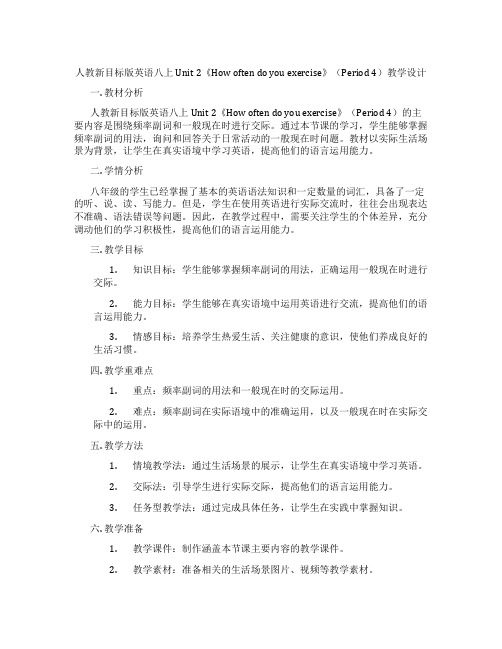
人教新目标版英语八上Unit 2《How often do you exercise》(Period 4)教学设计一. 教材分析人教新目标版英语八上Unit 2《How often do you exercise》(Period 4)的主要内容是围绕频率副词和一般现在时进行交际。
通过本节课的学习,学生能够掌握频率副词的用法,询问和回答关于日常活动的一般现在时问题。
教材以实际生活场景为背景,让学生在真实语境中学习英语,提高他们的语言运用能力。
二. 学情分析八年级的学生已经掌握了基本的英语语法知识和一定数量的词汇,具备了一定的听、说、读、写能力。
但是,学生在使用英语进行实际交流时,往往会出现表达不准确、语法错误等问题。
因此,在教学过程中,需要关注学生的个体差异,充分调动他们的学习积极性,提高他们的语言运用能力。
三. 教学目标1.知识目标:学生能够掌握频率副词的用法,正确运用一般现在时进行交际。
2.能力目标:学生能够在真实语境中运用英语进行交流,提高他们的语言运用能力。
3.情感目标:培养学生热爱生活、关注健康的意识,使他们养成良好的生活习惯。
四. 教学重难点1.重点:频率副词的用法和一般现在时的交际运用。
2.难点:频率副词在实际语境中的准确运用,以及一般现在时在实际交际中的运用。
五. 教学方法1.情境教学法:通过生活场景的展示,让学生在真实语境中学习英语。
2.交际法:引导学生进行实际交际,提高他们的语言运用能力。
3.任务型教学法:通过完成具体任务,让学生在实践中掌握知识。
六. 教学准备1.教学课件:制作涵盖本节课主要内容的教学课件。
2.教学素材:准备相关的生活场景图片、视频等教学素材。
3.作业布置:提前为学生布置相关的预习作业。
七. 教学过程1.导入(5分钟)利用图片或视频展示一些运动场景,引导学生谈论日常生活中喜欢的运动。
教师提问:“What sports do you like?”,学生回答:“I like playing basketball.”等。
人教新目标八年级上册Unit 2 How often do you exercise?(Sectio
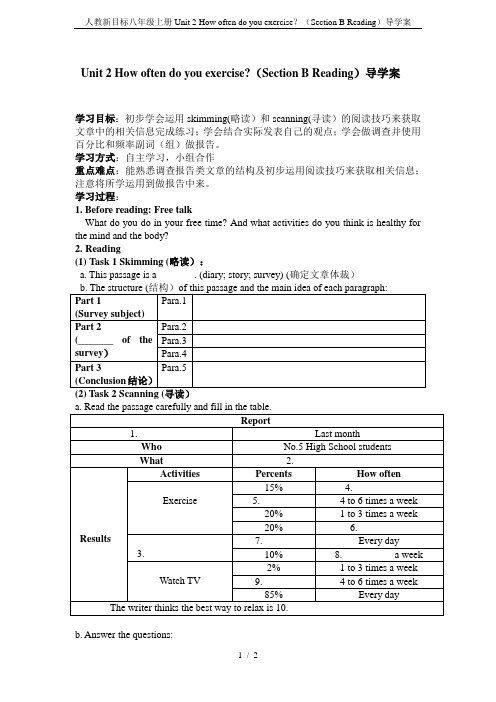
Unit 2 How often do you exercise?(Section B Reading)导学案学习目标:初步学会运用skimming(略读)和scanning(寻读)的阅读技巧来获取文章中的相关信息完成练习;学会结合实际发表自己的观点;学会做调查并使用百分比和频率副词(组)做报告。
学习方式:自主学习,小组合作重点难点:能熟悉调查报告类文章的结构及初步运用阅读技巧来获取相关信息;注意将所学运用到做报告中来。
学习过程:1. Before reading: Free talkWhat do you do in your free time? And what activities do you think is healthy for the mind and the body?2.Reading(1)Task 1 Skimming (略读):a. This passage is a _______. (diary; story; survey) (确定文章体裁)b. Answer the questions:1. How often do most students watch TV? What do they usually watch?2. Do most students use the Internet for homework? If not, then what do they use it for?3. Do you think the students at No.5 High School are healthy? Why or why not?(3)Discussion(讨论)with partnersa. In No. 5 High School, 20% of the students don't exercise at all. Then do you like exercising? Why or why not?Tips (提示): 1. Talk about the reasons you don't like it;2. Say some benefits(益处)that exercise brings to you.b. Competition (竞赛):Show your opinions(观点)3.After reading: Group-work (make a survey)(1) Choose(选择)one activity to make a survey in your group.(2)After filling in the table, please make a pie chart (饼形统计图)and give a brief(简短的)report.(3)Show time: Show your pie chart and give a report.课后反思:1.今天这节阅读课我学到了什么?_____________________________________________________________________ _____________________________________________________________________ 2.今天这节课我在哪些方面还有待加强?_____________________________________________________________________ _____________________________________________________________________。
人教版新目标初二英语上第二单元--how often do you excercise?
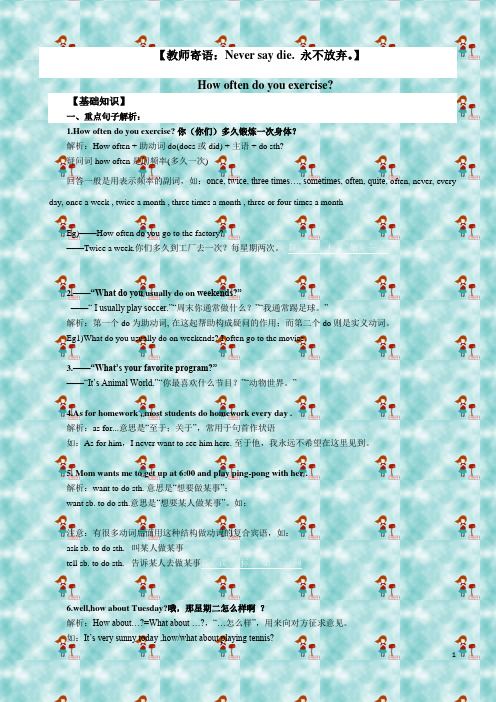
【教师寄语:Never say die. 永不放弃。
】How often do you exercise?【基础知识】一、重点句子解析:1.How often do you exercise? 你(你们)多久锻炼一次身体?解析:How often + 助动词do(does或did) + 主语 + do sth?疑问词how often是问频率(多久一次)回答一般是用表示频率的副词,如:once, twice, three times…, sometimes, often, quite, often, never, every day, once a week , twice a month , three times a month , three or four times a monthEg)——How often do you go to the factory?——Twice a week.你们多久到工厂去一次?每星期两次。
新课标第一网2.——“What do you usually do on weekends?”——“ I usually play soccer.”“周末你通常做什么?”“我通常踢足球。
”解析:第一个do为助动词, 在这起帮助构成疑问的作用;而第二个do则是实义动词。
Eg1)What do you usually do on weekends? I often go to the movies.3.——“What’s your favorite program?”——“It’s Animal World.”“你最喜欢什么节目?”“动物世界。
”4.As for homework , most students do homework every day .解析:as for...意思是“至于;关于”,常用于句首作状语如:As for him,I never want to see him here. 至于他,我永远不希望在这里见到。
人教新目标八年级英语上册Unit 2 How often do you exercise 单元知识点总结

Unit 2 How often do you exercise?一、词型转换Section A1.ever →(反义词) never2.shop →(现在分词) shopping3.full →(反义词) empty4.read →(pt.) readSection B→(v.)act1.active→(n.) activity2.health →(adj.) healthy →(反义词) unhealthy3.body →(pl.) bodies4.die →(pt.) died5.write →(n.表人) writer6.keep →(pt.) kept →(pp.) kept7.little →(比较级) less→(最高级) least8.though →(同义词) although二、短语归纳Section A1.how often 多久一次2.read English books 看英语书3.of course 当然4.on weekends 在周末5.go to the movies 去看电影6.hardly ever 几乎不;不曾7.every day 每天once a day 每天一次8.twice a week 每周两次three times a month 每月三次e the Internet 上网10.have dance and piano lessons 上舞蹈和钢琴课11.play tennis 打网球12.help with housework 帮忙做家务13.at least 至少,不少于Section B1.junk food 垃圾食品2.drink milk 喝牛奶3.three or four times a week 一周三到四次4.eat fruit 吃水果5.want sb. to do sth. 想要某人做某事6.be good/bad for 对……有好处/坏处7.go camping in the country 去乡下露营8.play sports 做运动9.one to three times a week 一周一至三次10.such as 例如11.fifteen percent of our students 我们百分之十五的学生12.go to the dentist 去看牙医13.more than 多于14.less than 少于重点句子1.how often do you exercise?你多久锻炼一次2.—What do you usually do on weekends?—周末你通常干什么?—I usually play soccer.—我通常踢足球。
人教版新目标八年级上册Unit 2 How often do you exercise

Activities
sleep, stay up late
Daily habits
Free time activities
Structures
play sports
Frequency
A:What do you usually do on weekends? B: I always exercises A: How often do you ….? B: I always / often …..
1. 多久一次 how often 3.熬夜stay up late 5.早睡 go to bed early 7.用电脑 use the Internet 9.想要某人做某事 want sb to do sth 2.一个月一次 once a month 4.至少 at least 6.做运动 do sports 8.对......有好处 be good for 10.问......关于..at all 13.虽然;即使 although 15.例如 such as eg: 百分之二十的学生根本不做运动!
12.......的答案 answer to 14.做某事对某人怎样 It's + adj. +for sb to do sth
Twenty percent of the students do not exercise at all! 关于看电视这一问题的答案同样有趣。 The answers to our questions about watching television were also interesting.
eg:他们多久熬一次夜?How often do they stay up late? Never. They always go to bed early. 从不,他们总是睡得早。
人教版新目标八年级上unit2课件、教案Unit_2_How_often_do_you_e
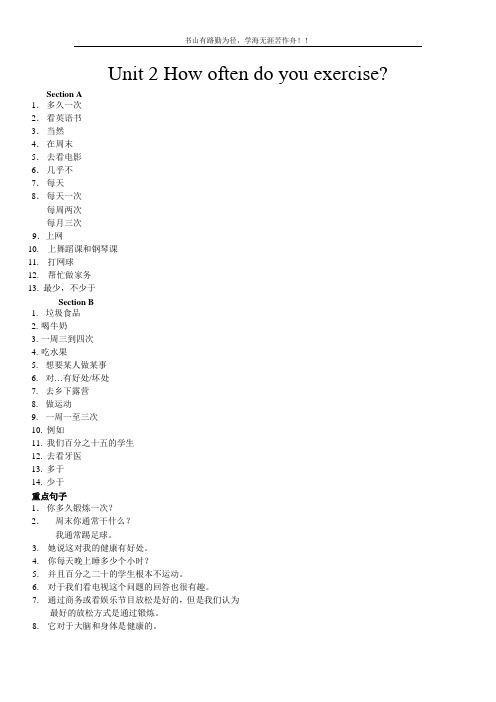
书山有路勤为径,学海无涯苦作舟!!Unit 2 How often do you exercise?Section A1.多久一次2.看英语书3.当然4.在周末5.去看电影6.几乎不7.每天8.每天一次每周两次每月三次9.上网10. 上舞蹈课和钢琴课11. 打网球12. 帮忙做家务13. 最少,不少于Section B1.垃圾食品2.喝牛奶3.一周三到四次4.吃水果5.想要某人做某事6.对…有好处/坏处7.去乡下露营8.做运动9.一周一至三次10.例如11.我们百分之十五的学生12.去看牙医13.多于14.少于重点句子1.你多久锻炼一次?2.---周末你通常干什么?---我通常踢足球。
3. 她说这对我的健康有好处。
4. 你每天晚上睡多少个小时?5. 并且百分之二十的学生根本不运动。
6. 对于我们看电视这个问题的回答也很有趣。
7. 通过商务或看娱乐节目放松是好的,但是我们认为最好的放松方式是通过锻炼。
8. 它对于大脑和身体是健康的。
难点1._______ 是对表示频度的时间状语的提问,可翻译为“多久一次”。
_________多远,________多少(接可数名词),__________多少(接不可数名词),________多久后(将来时中对含in….的词组的提问,如He will come back in three weeks.),__________(年龄)多大。
2. exercise 作动词时,可做_______动词,如He exercises every day. 也可作__________动词,如:She exercises her dog every day. 作名词时,意为“锻炼、运动”时是_________名词,意为”体操,练习题”时是_________名词。
2. 想要某物_____________________ 想要做某事____________________想要某(人)不做某事____________________3. 对…有益处/害处____________________ 对…好______________________ 擅长…______________________4. 对某人来说做某事…. ______________________________________________.5.做某事最好的方法__________________________/_____________________6.通过某种方式用介词______,其后如果是动词要用_________形式。
新目标八年级上Unit2Howoftendoyouexercise
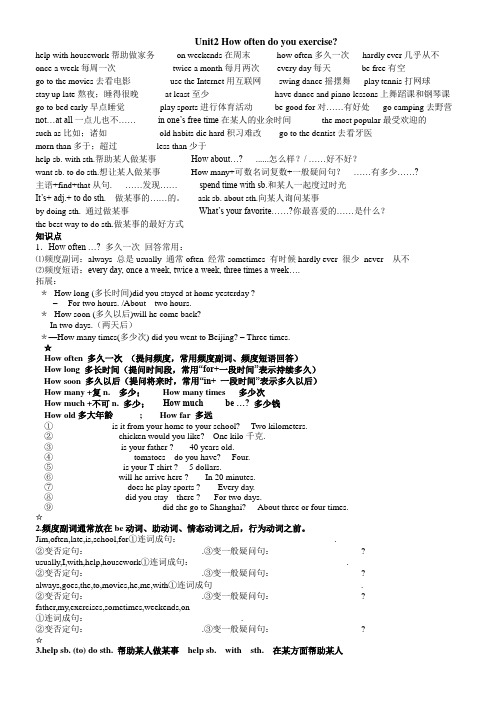
Unit2 How often do you exercise?help with housework帮助做家务on weekends在周末how often多久一次hardly ever几乎从不once a week每周一次twice a month每月两次every day每天be free有空go to the movies去看电影use the Internet用互联网swing dance摇摆舞play tennis打网球stay up late熬夜;睡得很晚at least至少have dance and piano lessons上舞蹈课和钢琴课go to bed early早点睡觉play sports进行体育活动be good for对……有好处go camping去野营not…at all一点儿也不…… in one’s free time在某人的业余时间the most popular最受欢迎的such as比如;诸如old habits die hard积习难改go to the dentist去看牙医morn than多于;超过less than少于help sb. with sth.帮助某人做某事How about…? ......怎么样?/ ……好不好?want sb. to do sth.想让某人做某事How many+可数名词复数+一般疑问句?……有多少……?主语+find+that从句. ……发现…… spend time with sb.和某人一起度过时光It’s+ adj.+ to do sth. 做某事的……的。
ask sb. about sth.向某人询问某事by doing sth. 通过做某事What’s your favorite……?你最喜爱的……是什么?the best way to do sth.做某事的最好方式知识点1.How often …? 多久一次回答常用:⑴频度副词:always 总是usually 通常often 经常sometimes 有时候hardly ever 很少never 从不⑵频度短语:every day, once a week, twice a week, three times a week….拓展:*--How long (多长时间)did you stayed at home yesterday ?–For two hours. /About two hours.*--How soon (多久以后)will he come back?--In two days.(两天后)*—How many times(多少次) did you went to Beijing? – Three times.☆How often 多久一次(提问频度,常用频度副词、频度短语回答)How long 多长时间(提问时间段,常用“for+一段时间”表示持续多久)How soon 多久以后(提问将来时,常用“in+ 一段时间”表示多久以后)How many +复n. 多少;How many times 多少次How much +不可n. 多少;How much be …? 多少钱How old多大年龄; How far 多远①---______ _____is it from your home to your school?--- Two kilometers.②--- _____ _____ chicken would you like?---One kilo千克.③--- _____ _______ is your father ? ---- 40 years old.④--- ______ ______ tomatoes do you have?--- Four.⑤--- _____ ______ is your T-shirt ?--- 5 dollars.⑥---______ ______ will he arrive here ?----- In 20 minutes.⑦---_______ _______ does he play sports ? _--- Every day.⑧---_______ _______did you stay there ?---- For two days.⑨---______ _______ _______ did she go to Shanghai?----About three or four times.☆2.频度副词通常放在be动词、助动词、情态动词之后,行为动词之前。
人教新目标八年级上册英语《Unit 2 How often do you exercise?》Sec
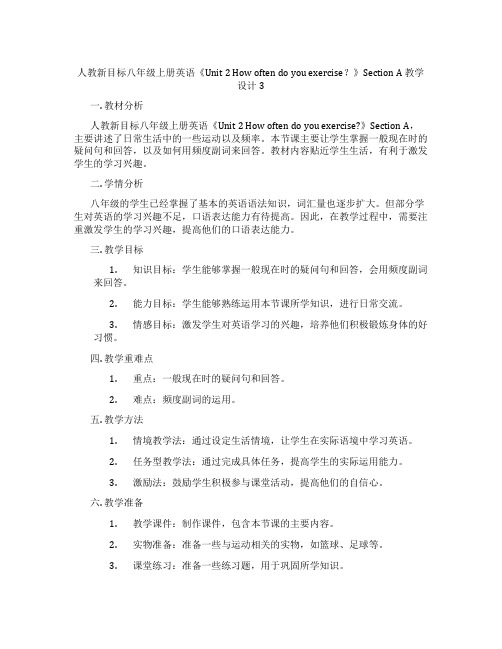
人教新目标八年级上册英语《Unit 2 How often do you exercise?》Section A 教学设计3一. 教材分析人教新目标八年级上册英语《Unit 2 How often do you exercise?》Section A,主要讲述了日常生活中的一些运动以及频率。
本节课主要让学生掌握一般现在时的疑问句和回答,以及如何用频度副词来回答。
教材内容贴近学生生活,有利于激发学生的学习兴趣。
二. 学情分析八年级的学生已经掌握了基本的英语语法知识,词汇量也逐步扩大。
但部分学生对英语的学习兴趣不足,口语表达能力有待提高。
因此,在教学过程中,需要注重激发学生的学习兴趣,提高他们的口语表达能力。
三. 教学目标1.知识目标:学生能够掌握一般现在时的疑问句和回答,会用频度副词来回答。
2.能力目标:学生能够熟练运用本节课所学知识,进行日常交流。
3.情感目标:激发学生对英语学习的兴趣,培养他们积极锻炼身体的好习惯。
四. 教学重难点1.重点:一般现在时的疑问句和回答。
2.难点:频度副词的运用。
五. 教学方法1.情境教学法:通过设定生活情境,让学生在实际语境中学习英语。
2.任务型教学法:通过完成具体任务,提高学生的实际运用能力。
3.激励法:鼓励学生积极参与课堂活动,提高他们的自信心。
六. 教学准备1.教学课件:制作课件,包含本节课的主要内容。
2.实物准备:准备一些与运动相关的实物,如篮球、足球等。
3.课堂练习:准备一些练习题,用于巩固所学知识。
七. 教学过程1.导入(5分钟)利用课件展示一些运动的图片,如篮球、足球、游泳等,引导学生说出这些运动的名称。
然后提问:“Do you often exercise? Why?”,让学生谈论自己是否经常锻炼以及原因。
2.呈现(10分钟)展示教材中的插图,让学生观察并回答:“How often do they exercise?”,引导学生学会用一般现在时提问。
人教版新目标版八年级英语上册 Unit 2 How often do you exercise?单元知识归纳
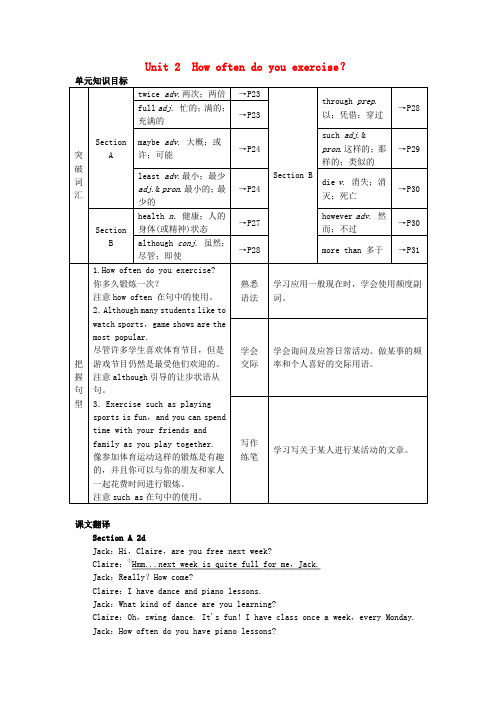
Unit 2 How often do you exercise?课文翻译Section A 2dJack:Hi,Claire,are you free next week?Claire:①Hmm...next week is quite full for me,Jack.Jack:Really?How come?Claire:I have dance and piano lessons.Jack:What kind of dance are you learning?Claire:Oh,swing dance. It's fun!I have class once a week,every Monday.Jack:How often do you have piano lessons?Claire:Twice a week,on Wednesday and Friday.Jack:Well,how about Tuesday?Claire:Oh,I have to play tennis with my friends.But do you want to come?Jack:Sure!,杰克:你好,克莱尔,下周你有空吗?克莱尔:呣……下周我很忙,杰克。
杰克:真的吗?怎么会那样?克莱尔:我上舞蹈课和钢琴课。
杰克:你学习的是什么舞蹈?克莱尔:噢,摇摆舞。
很有趣!我一周上一次课,每周一上课。
杰克:你多久上一次钢琴课?克莱尔:一周两次,在周三和周五。
杰克:噢,周二怎么样?克莱尔:哦,我要与朋友打网球。
你想来参加吗?杰克:当然了!知识详解1.How often do you exercise?你多久锻炼一次?【解读】本句是含有特殊疑问词how often 的特殊疑问句。
【解读】how often 多久一次,用于对动作发生的频率进行提问。
回答应该是频度副词或表示频率的词组,如always,usually,often,sometimes,hardly,ever,never,every day,once a week,three times a day等。
- 1、下载文档前请自行甄别文档内容的完整性,平台不提供额外的编辑、内容补充、找答案等附加服务。
- 2、"仅部分预览"的文档,不可在线预览部分如存在完整性等问题,可反馈申请退款(可完整预览的文档不适用该条件!)。
- 3、如文档侵犯您的权益,请联系客服反馈,我们会尽快为您处理(人工客服工作时间:9:00-18:30)。
其反义为:be bad for... Reading in bed is bad for your eyes. 躺在床上读书对你的眼睛有害。 3. How many hours do you sleep everw much。如: How much coffee do you drink every day? 你每天喝多少咖啡呢?
Grammar focus频度副词
• 1.常见的有always,often,sometimes,usually 等, • 2.表示否定意义的有:hardly,seldom,never 应置于行为动词之前,或两个动词之间。 • 3.词组:once a…; twice a…; three times
How often “多久一次(表示频率)” How long “(物体)多长,多长时间 ” How many “多少” (可数n.复数) How much “多少”(价格,不可数n.) How soon “多久(以后)”,表将来 ,用“in+一段时间”回答 How far “(距离)多远”
Report: In my spare time, I watch TV every day. I sometimes surf the Internet in the evening. I hardly ever read English books. I go to the movies once a week. I never exercise.
5. Maybe your mother is in the kitchen. (改为同义句) may ____ be in the kitchen. Your mother ____
Unit 2
section B
1. Mom wants me to get up at 6:00 and play ping-pong with her. want to do sth. 想要做某事 want sb. to do sth. 想要某人做某事 Do you want to go to the movies with me? 你想和我一起去看电影吗? The teacher doesn’t want us to eat hamburgers. 老师不想让我们吃汉堡包。
句型转换 1. I usually go shopping on weekends. (变 为一般疑问句) Do you usually _____ go shopping on ____ weekends? 2. She often helps with housework at home. (同上) Does she often ______ help with housework? _____
100%
频度副词
① 对其提问用How often。
② (模糊概念的)频度副词,在句中放在V 助,V情,be之后, V实之前。 ③表示具体频率的词组,一般放在句末。
once a week
three times a week five times two months
every day, always, usually, often, sometimes once /twice a week hardly ever never
2b Read the article
What Do No.5 High School Students Do in Their Free Time Last month we asked our students about their free time activities. Our questions were about exercise, use of the Internet and watching TV. Here are the results. We found that only fifteen percent of our students exercise every day. Forty-five percent exercise four to six times a week. Twenty percent exercise only one to three times a week. And twenty percent do not exercise at all! We all know that many students often go online, but we were surprised that ninety percent of them use the Internet every day. The other ten percent use it at least three or four times a week. Most students use it for fun and not for homework.
3. They visit their grandparents once a month. (提问) How often do they visit their ______ ____ ____ grandparents? 4. She always watch TV after dinner. (提问) ____ _____ _____ she ______ TV after dinner? How often does watch
Notes
2. She says it’s good for my health. be good for... 表示对……有益 (有好处) (这里 for 是介词,后跟名词、代词、动名 词或动词的-ing 形式。)如: It’s good for us to do more reading. 多读书对我们有好处。 Reading aloud is good for improving your English. 大声朗读对提高你的英语后好处。
Unit 2
section A
How often do you exercise复习课件
(模糊概念的)频度副词 在句中的位置是: be动词或助动词之 后,实义动词之前。
从未
never
hardly ever sometimes often usually always
0%
很少;几乎不
有时
常常
通常 总是
